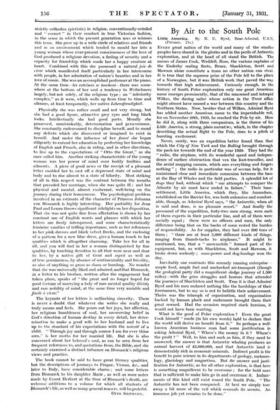By Air to the South Pole
Little America. By R. E. Byrd, Rear-Admiral, U.S.N. (Putnam. 21s.) EVERY great nation of the world and many of the smaller peoples have shared in the glories and in the perils of Antarctic exploration, and at the head of all stand the British. The names of James Cook, Weddell, Ross, the various captains of the Enderby sealing fleets, Bruce, Shackleton, Scott and Mawson alone constitute a team no other nation can rival. It is true that the supreme prize of the Pole fell to the pluck of a Norwegian, but it was British work that paved the way towards that high achievement. Curiously enough, in the history of South Polar exploration only one great American name emerges prominently, that of the renowned and intrepid Wilkes, the daring sailor whose action in the Trent affair might almost have caused a war between this country and the Northern States. Now, besides that of Wilkes, Admiral Byrd has added another American name to the imperishable roll, for on November 29th, 1929, he reached the Pole by air. How he did it, along with three companions, is the theme of his Little America, a strong, plain narrative, which, in the chapter describing the actual flight to the Pole, rises to a pitch of bursting excitement.
Never, surely, was an expedition better found than that which the City of New York and the Bolling brought through the pack-ice towards the end of the year 1928. They had the " radio, the airplane, with its wonderful speed and indepen- dence of surface obstruction that vex the foot-traveller, and the aerial mapping camera, which sees everything and forgets nothing " ; the radio in particular was of sovran help, for it maintained close and immediate connexion between the base at the Bay of Whales and the field parties. A splendid lot of dogs they had, without which " our attempts to conquer the Atlantic by air must have ended in failure." Their base- settlement, Little America, which they, like Amundsen, established on the Barrier Ice, was both extensive and comfort- able, though, as Admiral Byrd says, " the Antarctic, when all is said and done, is no pleasure resort." And finally the personnel of the expedition, forty-two men strong, were each of them experts in their particular line, and all of them were socially equal ; there were no officers and men, the only difference being that on the backs of some rested the burden of responsibility. As for supplies, they had over 500 tons of
them ; there are at least 5,000 different kinds of things, ranging from thumb-tacks to airplanes." It might be mentioned, too, that a snowmobile " formed part of the equipment, but, as with Shackleton, Scott and Mawson, it broke down uselessly ; man-power and dog-haulage won the day.
Inevitably one contrasts this serenely running enterprise—
ample food, ample fuel and unchecked air-transport (though the geological party did a magnificent sledge journey of 1,500 miles)—with the grim struggles and horrors that attended the journeys of Shackleton and Scott. True it is that Admiral Byrd and his men endured nothing like the hardships of their forerunners, but to say so is not to belittle their achievement. Theirs was the triumph of organization, and organization backed by human pluck and endurance brought them their great reward. Had the occasion required stark heroism, it would not have been wanting.
What is the good of Polar exploration ? Even the great Cook himself " made (in his own words) bpld to declare that the world will derive no benefit from it." So perhaps a well- known American business man had some justification in asking Admiral Byrd, " Where's the money in it ? Where's the profit ? " Well, to him and such as him, if they need be answered, the answer is that Antarctic whaling produces an annual harvest of £3,000,000, and that Antarctic land is demonstrably rich in economic minerals. Indirect profit is the
benefit to pure science in its departments of geology, meteoro- logy, glaciology and magnetism. But the answer and justi-
fication for Antarctic, as for all other exploration, is that here is something magnificent to be overcome ; for the bold man that is sufficient to make him go in and overcome it. Induce- ments of this kind still exist round the South Pole. " The Antarctic has not been conquered. At best we simply tore away a bit more of the veil which conceals its secrets. An immense job yet remains to be done."






































 Previous page
Previous page